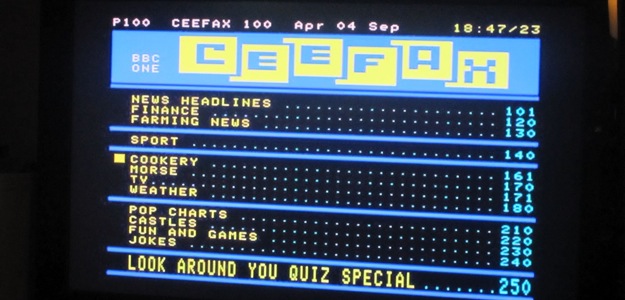 You may have missed it, but a little bit of television history came to an end this weekend as the BBC essentially pulled the plus on its Ceefax transmissions, bringing to an end the world’s first teletext service.
You may have missed it, but a little bit of television history came to an end this weekend as the BBC essentially pulled the plus on its Ceefax transmissions, bringing to an end the world’s first teletext service.
Officially, the service doesn’t actually end until this Wednesday, when Northern Ireland broadcasters complete the digital switchover from analog to digital transmissions, but with the BBC sending the final update to the service yesterday, it could be considered that all that remains of the service for the next couple of days is a ghost of what was, at one time, a proto-Internet that introduced multiple generations to the idea of regularly-updated written content available electronically, offering an update to the notion of newspapers as a permanent information source of unchanging record.
Ceefax – Its name a phonetic play on the idea of “see facts” – originated in the 1960s, when two BBC engineers, Geoff Larkby and Barry Pyatt, were tasked with creating a way in which the BBC could make use of its non-programming “closedown” time by transmitting what was then described as “the equivalent of one page of The Times newspaper” in terms of information. It took until the early 1970s before the project actually got anywhere, by which point both Larkby and Pyatt had left the corporation; nonetheless, their brainchild – which had by 1972 been given the name with which it became famous – was finally officially launched on September 23, 1974 after two years of testing, with the technology behind it also being used to create an early form of closed captioning for deaf and hard-of-hearing viewers.
In pre-Internet times, Ceefax – and the parallel service from the BBC’s independent competitor, Oracle – became something of a cult within the United Kingdom, a mass media that was nonetheless often ignored or forgotten by many, and therefore something able to take more creative risks in terms of writing and reporting; by the mid-1980s, it was no longer just broadcast during closedown hours, but available at the press of a button at any point during the day, and able to offer up-to-the-minute news coverage of breaking stories in a way that television and radio weren’t quite equipped to until the creation of 24-hour-news channels. As the Ceefax system became better known, it became the basis for all Teletext broadcasting in Europe, eventually becoming recognized as the World System Teletext.
Of course, as technology improved elsewhere, Ceefax (and Teletext in general) started to seem outdated and somewhat irrelevant when compared with both the Internet and text-based services available through digital sources. Britain’s independent networks dropped Oracle broadcasts back in 2009, and Ceefax has been facing a slow, drawn-out end since plans for the UK’s television to go all-digital were announced in 2006. Come Wednesday, Ceefax will become just a footnote in technical history, but speaking as one who feels as if he was taught to read the Internet by Ceefax, it’ll be one that’ll be much missed.


